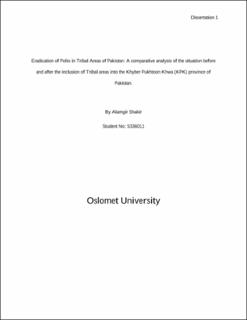| dc.description.abstract | The study analyzes the eradication of polio in the tribal areas of Pakistan by employing a qualitative methodology for the collection of data and thematic analysis for subsequent analysis of the collected data. The data has been collected through a systematic literature review approach that includes the identification and review of scholarly articles that are relevant and credible in the context of the topic under consideration. It is analyzed that there are several factors that create barriers to the eradication of polio in the FATA region of Pakistan both before and after its inclusion into the Khyber Pukhtoon Khwa Province of the country. It is also found that a significant increase in the active cases of the polio virus has been experienced due to the Covid-19 pandemic because resources and efforts allocated to the polio eradication programs have significantly diverted towards halting the widespread of the Covid-19 pandemic internationally. Due to the Covid-19 pandemic's sensitivity, international agencies have suspended polio campaigns as of the beginning of 2020, which would cause a new wave of polio. Furthermore, the study has brought about several theoretical and practical implications and suggested that governments and other stakeholders need to take effective initiatives in order to eradicate polio from the tribal areas, especially through the initiation of programs to spread gross awareness among the general public of the country. In addition to that certain limitations of the study are also highlighted, and recommendations are extended to future researchers to overcome these limitations in the future; for instance, future researchers should select multiple areas of Pakistan or more than one country as a sample to present more generalizable and replicable findings in the future. | en_US |
